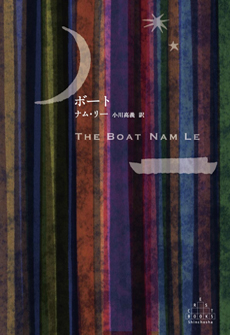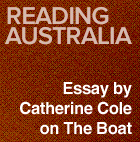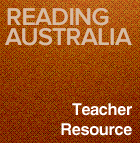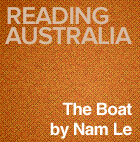AustLit
-
The Boat by Nam Le is a collection of short stories set in a range of locations including Iowa City, New York City, Colombia, Hiroshima, and Tehran. The first story, ‘Love and Honor and Pity and Pride and Compassion and Sacrifice,’ is about a young writer named Nam who studies at the Iowa Writers’ Workshop. In this story, Nam’s writer friend repeats the suggestion of the great American novelist William Faulkner that ‘we should write about the old verities. Love and honour and pity and pride and compassion and sacrifice.’ The Boat is a collection that examines these ‘old verities’ while also depicting a contemporary, global world.
– Part One of this exhibition examines the idea of 'ethnic' literature.
– Part Two examines possible real-life inspirations for Le's stories.
– Part Three touches on the metafictional quality of 'Love and Honor'.
– Part Four draws together critical commentary on the book. Some of these critical works and other resources are available to read online.
Click the hyperlinks in the citations below to be taken to the full text.
-
 Courtesy the publisher.See full AustLit entry
Courtesy the publisher.See full AustLit entry'In the magnificent opening story, "Love and Honor and Pity and Pride and Compassion and Sacrifice," a young writer is urged by his friends to mine his father's experiences in Vietnam - and what seems at first a satire on turning one's life into literary commerce becomes a transcendent exploration of homeland, and the ties between father and son. "Cartagena" provides a visceral glimpse of life in Colombia as it enters the mind of a fourteen-year-old hit man facing the ultimate test. In "Meeting Elise" an ageing New York painter mourns his body's decline as he prepares to meet his daughter on the eve of her Carnegie Hall debut.
(...more) -
See full AustLit entry
Nam Le was born in Vietnam, and arrived in Australia with his parents as a very young child. He was raised in Melbourne, where he attended first Melbourne Grammar School and then the University of Melbourne.
At the University of Melbourne, Le completed a B.A. Hons (for which he wrote a dissertation on W.H. Auden under the supervision of poet Chris Wallace-Crabbe) and an LLB (Hons), after which he was admitted to the Supreme Court of Victoria as a lawyer.
-
See full AustLit entry
Written for the Reading Australia project, this essay serves as an introduction to Nam Le's The Boat. Cole discusses how the book 'offers a new conversation about the Vietnam War and its aftermath. The collection encompasses a diverse geography, from Iran to Colombia, the United States to Australia, Japan and the South China Sea, yet the Vietnam War is an assertive presence too in the collection’s first and last stories, "Love and Honour and Pity and Pride and Compassion and Sacrifice" and "The Boat".
(...more)Available online at Reading Australia.
-
Translations
The Boat has been translated into many languages including Vietnamese, Norwegian, Finnish, Croatian, French, Spanish, Swedish, Japanese, Korea, and Italian. The covers for these works are displayed on Le’s website.
-
Le’s work demands that we consider what ‘ethnic’ literature is, what it means to write it, and what it means that it is a ‘hot’ commodity. The articles below also consider these questions.
AustLit's Australian Multicultural Writers project, led by The University of Wollongong, provides information about and records relating to the writers and writing from non-Australian backgrounds. It also collects information about Australian literature published in languages other than English with almost 50,000 records listed. Explore our rich multicultural heritage here.
-
This article examines The Boat as a coherent collection of stories that self-consciously takes up, in 'Love and Honor,' some central debates in Asian American literary studies: questions of cultural authenticity, authorial ownership, responsible representation of trauma, the selling out of the community by subsequent generations, and what constitutes Asian American literature and/or 'ethnic literature.' It argues that Le complicates the concept of ethnic literature through the middle stories of the collection by imbricating the ethnic with the cosmopolitan, two concepts that are usually viewed in opposition, to arrive at the idea of 'refugee cosmopolitanism' in the final story, 'The Boat' (Author's abstract). (...more)See full AustLit entry
Goellnicht, Donald C. '"Ethnic Literature’s Hot": Asian American Literature, Refugee Cosmopolitanism, and Nam Le's The Boat.' Journal of Asian American Studies 15.2 (2012): 197-224.
-
Krys Le’s article argues that ‘[a] term originally intended to empower those traditionally marginalized can be used to dismiss minority writers.’
Le, Krys. ‘Should We Still Be Using the Term “Ethnic Literature”?’ Huffington Post 23 Feb. 2012. Online at http://www.huffingtonpost.com/krys-lee/should-we-still-be-using-_b_1291861.html. Sighted 02/12/2013.
-
'With reference to recent debates about the politics of representation, this paper argues that a profound ambivalence about identity, and particularly about Asian Australian identity, is a common characteristic of much recent Asian Australian literary writing. It also asks whether this is the characteristic that marks this writing as specifically Australian. Tracing cultural contexts from the 'pathologies' of Australian multicultural debates to other transnational literary traditions, the paper uses examples from the writing of Brian Castro, Alice Pung, Ouyang Yu, Nam Le, Shaun Tan, and Tom Cho to speculate on the emergence of a new and distinct phase of transnational writing in Australia. (...more)See full AustLit entry
Ommundsen, Wenche. ‘”This Story Does Not Begin on a Boat”: What is Australian about Asian Australian Writing?’ Continuum: Journal of Media & Cultural Studies 25.4 (2011): 503-513.
-
The Boat is notable for its range of settings and characters, from a Colombian teenage hitman to an aging New York painter and a young girl in WWII Hiroshima. Many of the stories are set in complex political or historical contexts. Below are examples of the real-life events and contexts that appear in some of the stories.
-
In ‘Love and Honor and Pity and Pride and Compassion and Sacrifice,’ the narrator’s father lived through the My Lai massacre. You can read more about those events at Digital History’s ‘My Lai Massacre.’
Mintz, S., and McNeil, S. ‘My Lai Massacre.’ Digital History. 2013. Online at htttp://www.digitalhistory.uh.edu/learning_history/vietnam/vietnam_mylai.cfm. Sighted 27/10/2013.
-
Le’s story ‘Cartagena’ is about a teenage hitman in Colombia. In a story for the New York Times, ‘The 14-Year-Old Hitman,’ Eliza Griswold writes about some of the real-life teenagers who work as assassins due to a legal loophole that means minors are not prosecuted for their crimes.
Griswold, Eliza. ‘The 14-Year-Old Hitman.’ The New York Times. April 28, 2002. Online at http://www.nytimes.com/2002/04/28/magazine/the-14-year-old-hit-man.html?pagewanted=all&src=pm. Sighted 28/10/13.
-
The first story in The Boat, ‘Love and Honor and Pity and Pride and Compassion and Sacrifice’ is a metafiction in which an author named Nam Le tries to write a story. Metafiction is fiction that draws attention to its own constructedness. For example, the narrator of metafiction might comment on the fictional nature of the story, or criticise the plot, or the characters might be aware that they are in a story. Some Australian novels that have a metafictional element include Helen Garner’s The Spare Room, J.M. Coetzee’s Summertime, and Tom Cho’s Look Who’s Morphing.
Garner, Helen. The Spare Room. Melbourne: Text, 2008.
Coetzee, J.M. Summertime: Scenes from Provincial Life. North Sydney: Knopf, 2009.
Cho, Tom. Look Who’s Morphing. Artarmon: Giramondo, 2009.
-
'This essay touches briefly on the works of Nam Le, Chi Vu and Dominic Hong Duc Golding, demonstrating how 'they provide a counter narrative to the dominant discourse of the Vietnam/America War in Australia, and, further, how they might pave a central place for Australian diasporic writing in general.' (Source: Introduction, p. 1)See full AustLit entry
(...more)Pham, Hoa. ‘Finding a Place in the World: Vietnamese-Australian Diasporic Writing.’ Long Paddock 71.1 (2011).
-
Ken Gelder introduces the concept of proximate reading as: ‘a way of thinking about reading practices broadly speaking, but in particular, a way of conceptualizing reading and literary writing in contemporary transnational frameworks. Proximate reading opens up a number of aspects of reading and literary practice that are to do with the way readers negotiate place, position and what can be called literary sociality (that is, relations between readers, texts and the meanings that bind these relations together), where these things are understood and evaluated in terms of degrees of closeness and/or distance, that is, proximity. (...more)See full AustLit entry
Gelder, Ken. 'Proximate Reading : Australian Literature in Transnational Reading Frameworks.' JASAL: Journal of the Association for the Study of Australian Literature; Common Readers and Cultural Critics Special Issue 2010.
-
'There are those of us who are trying to rethink the place of Australian literature in our lives, as readers and writers, students and teachers, and as participants in this society and culture. It's happening from different angles: in the academy, in literary studies, cultural studies, and Australian studies, including Australian history, at undergraduate and postgraduate levels, and in research frameworks; in secondary and primary education, locally and nationally; and in the public domain. It's also happening internationally, through translation, and in the many different spaces where Australian literature might have meaning. (...more)See full AustLit entry
Jose, Nicholas. ‘Rewriting Australian Literature.’ Teaching Australian Literature: From Classroom Conversations to National Imaginings. Ed. Brenton Doecke, Larissa McLean-Davies and Philip Mead. Kent Town: Wakefield Press; Australian Association for the Teaching of English, 2011. 95-107.
-
See full AustLit entry
Kunzru suggests in this review that 'The Boat is transparently a product of the increasingly formalized milieu in which American writers train — a well-wrought collection that, in its acute self-consciousness, trails a telltale whiff of 'the industry' that is its initial concern, of the 'heap of fellowship and job applications' the fictional Le needs 'to draft and submit' when he’s interrupted by his father. 'Ethnic lit' is unhappily what emerges when identity politics head into the marketing meeting [.
(...more)Kunzru, Hari. ‘Outside Ethnicity.’ Rev. of The Boat, by Nam Le. New York Times Book Review. 8 June 2008: 8. Online at http://www.nytimes.com/2008/06/08/books/
review/Kunzru-t.html. Sighted 09/12/2013.
-
See full AustLit entry
This interview discusses self-consciousness in literature, the differences in expectation that readers bring to short stories as compared to novels, the form of the stories in The Boat, and how the book came to be published.
(...more)‘LAist Interview: Nam Le, Author of The Boat’. LAist. July 9, 2008. Online at http://laist.com/2008/07/09/nam_le_theboat_laistinterview.php. Sighted 05/12/2013.
-
Leaving Vietnam
In the late 1970s, many people fled Vietnam by boat. The first five ‘boat people’—five boys—arrived in Australia in 1976. The SBS documentary Immigration Nation shows footage from that time and first-person accounts from some of those first arrivals. It explains how those arrivals would change the face of immigration in Australia. Parts of the documentary are available on YouTube.
SBS TV, Immigration Nation, (n.d.), http://www.sbs.com.au/immigrationnation/. Sighted 12/12/2013.
//www.youtube.com/embed/0hkUKXerM38?rel=0 -
See full AustLit entry
Kakutani asserts that the opening story, 'like many in The Boat, catches people in moments of extremis, confronted by death or loss or terror (or all three) and forced to grapple at the most fundamental level with who they are and what they want or believe. Whether it’s the prospect of dying at sea or being shot by a drug kingpin or losing family members in a war, Nam Le’s people are individuals trapped in the crosshairs of fate, forced to choose whether they will react like deer caught in the headlights, or whether they will find a way to confront or disarm the situation.
(...more)Kakutani, Michiko. 'A World of Stories from a Son of Vietnam.' The New York Times. 13 May 2008. Online at http://www.nytimes.com/2008/05/13/books/13kaku.html. Sighted 05/12/2013.
-
Writer Charles D’Ambrosio gives his impressions of Nam Le’s work and then the two discuss their writing, literary influences, and style, with Le asserting that ‘Style is everything. Style is eye, window, and view.’ (...more)See full AustLit entry
D’Ambrosio, Charles. 'Nam Le.' Interview with Nam Le. Bomb 108 (2009). Online at http://bombsite.com/issues/108/articles/3305. Sighted 02/12/2013.
You might be interested in...








